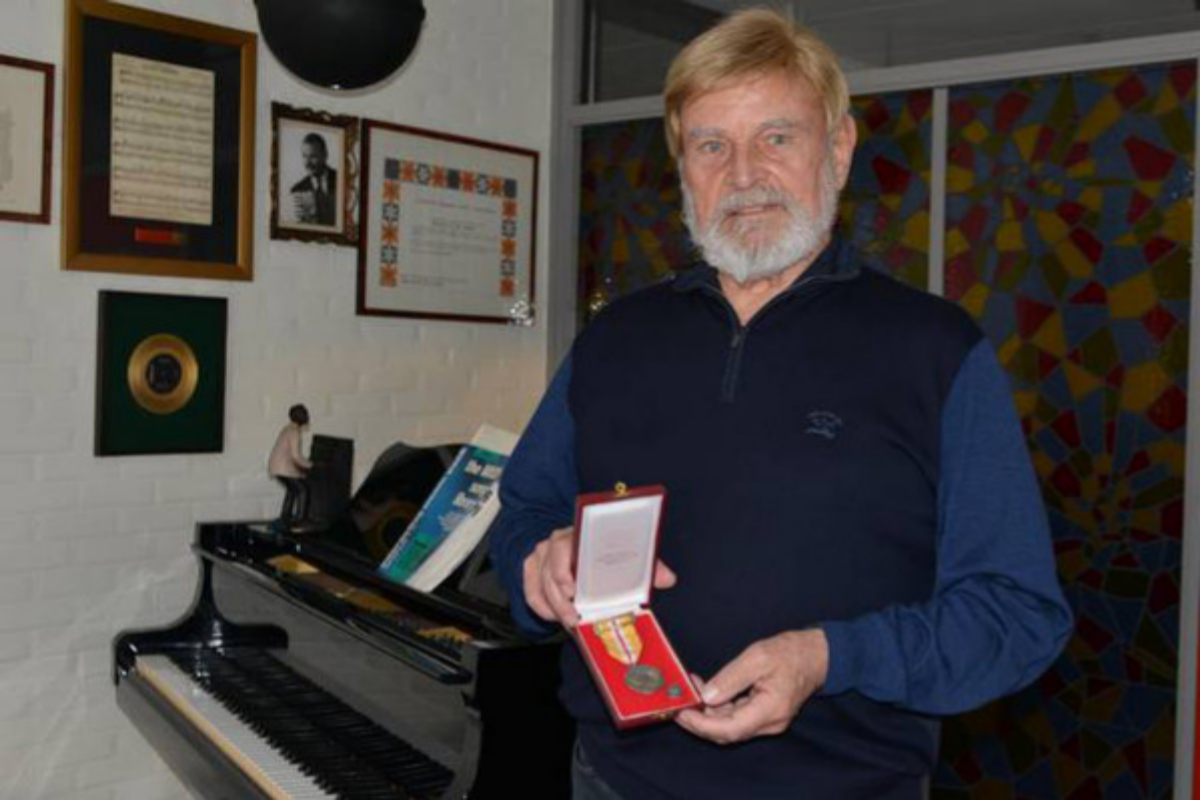Leo Caerts has carefully prepared the space in which he receives at his house in Zaventem (Belgium): on the living room table a poster of musical successes headed by his great success, a stack of old records, the libretto of the original composition, of 1971, and some of the medals he has received in his career.
Its composition Y viva España , a success that remains in time, was adapted and popularized by Manolo Escobar . "My wife and I were crazy about Spain, we wanted to live there," explains Caerts, with 89 years old , although by his appearance and vitality nobody would say it.
The dream never came true, but the summers he spent on the Costa Brava caught up in the spirit of Caerts , which ended up taking off Eviva Spain sleeve (a title "sui generis", a mixture of Italian "evviva" and "viva" Spanish), a pasodoble in the purest Iberian style .
The song was a commission made by Leo Caerts "tailored" for Samantha, a Belgian singer with a powerful voice whose authentic name was Christiane Bervoets . The lyrics, originally in Dutch, were provided by Leo Rozenstraten , with whom Caerts used to work.
"It easily came to my mind," he recalls, adding that the text spoke "of vacations, the sun and the sea", and explains that in those days Spain was beginning to become one of the tourist destinations Preferred from northern Europeans .
"Surely that was the reason why I did it," adds the author, who speaks wistfully of his summers in Playa d'Aro (Girona).
Samantha herself actively participated in the promotion of tourism to Spain, singing Eviva Spain on airplanes traveling full of "guiris" to the Spanish coast, recalls the composer. And after triumphing in Belgium and the Netherlands, the song was translated into English, French, German and Spanish .
What few know of Y viva España
The real bombing came with the Swedish singer Sylvia Vrethammar , who put the song on the list of best-selling "singles" in the United Kingdom in 1974, where he stayed for 39 consecutive weeks and sold nearly a million copies.
The letter of the Spanish version was commissioned by Manuel de Gómez , a Spanish emigrant who worked as a doorman at the Spanish embassy in Belgium, who gave him the "patriotic" touch .
"He was longing for Spain, he didn't like Belgium. He wrote a letter in Spanish that has nothing to do with vacations, the sun or the sea . The producer was very angry, he said" This guy is crazy, he hasn't translated! "recalls Caerts.
De Gomez included references to God and bullfighting (a tradition that the Belgian composer does not like) and with that letter he reached the famous Manolo Escobar (1931-2013), who popularized it in Spain.
"He did very well," says Caerts about the Spanish singer and explains that the Spanish and Belgian versions "were very different": Samantha "had an impressive voice and without her he could not have reached Manolo Escobar," he says .
"Sometimes you do something that changes your life forever. In my case it was that song," says a musician who, fifty years later , continues to receive copyright income every time his song plays on a television or radio.
The composer accumulates anecdotes , such as the occasion on which he received a medal in Madrid from the Ministry of Culture, which someone stole from him on the way back by car to Belgium.
An acquaintance of his wrote, without his knowing it, a letter to the then queen of the Belgians, the Spanish Fabiola de Mora y Aragón , explaining what happened and, months later, Fabiola sent him a new medal and a letter of thanks .
The pride he feels has been a bit tarnished, however, by the comments that have come to him lately about the "political use" of his song.
A few decades ago, on one of his vacations in Spain, Caerts said with some sadness, an employee of a hotel who learned that he had composed it, told him he was "Francoist . "
"I replied that he did not know the original text. That the song I composed has nothing to do with it, it is fun music, it talks about the sun, the sea ...", he explains.
In addition, he assures that in recent years he has been contacted by different Catalan media to find out why he decided to compose a theme turned into a "hymn" in the demonstrations in favor of the unity of Spain against the sovereign challenge.
"I explain that I have nothing to do with this," says Caerts, who makes it clear that he is not at all interested in politics and ends up agreeing to interpret his famous piano song: "I don't play it much since my wife died. 27 years ago, "he says.
The melody, which he still remembers by heart and interprets with incredible skill despite his aching hands, seems to fill the room with light and heat, on a cold and gray February day in Belgium.
According to the criteria of The Trust Project
Know more- music
- culture
IdolsRecycled J: "Pop is now what we do"
MusicMad Cool asks the City Council and Community of Madrid for a grant of 16 million euros
The final interviewCoque Malla: "Fiction must be wild without ethical nor moral norms"

